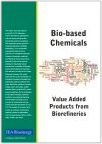What Is Catalysis:
In chemistry, catalysis refers to changing the speed of a reaction using a substance that’s not consumed by the reaction.
How It Relates to Green Chemistry:
Large amounts of waste are generated every day by chemical processes. In particular, using stoichiometric equivalents creates unwanted byproducts like inorganic salts. Stoichiometric chemical procedures are increasingly being replaced by more efficient catalytic alternatives, empowering chemists to reduce energy and resource consumption. Greener catalysis means moving away from stoichiometric processes to homogenous and heterogeneous catalytic reactions using organic, organometallic, inorganic and biological catalysts.
-
- Reduce Derivatives – a selective catalytic or enzymatic pathway to a chemical can use fewer reagents and energy while providing a more direct synthetic route (compared to stoichiometric syntheses)
- Catalysis – selective catalytic reagents are superior to stoichiometric ones; they can minimize or eliminate waste, depending on the reaction, which is necessary to achieve greener chemistry
- Maximize Resource Efficiency – catalysis can offer more direct synthetic routes, optimizing the time, energy and materials required to make a desired product
-
Ibuprofen
The synthesis of ibuprofen, a widely used anti-inflammatory compound, was reduced from six stoichiometric steps to three catalytic steps. The six-step stoichiometric reaction was inefficient; more than half of the ingredients became waste or byproducts rather than the desired compound. This new synthesis increased the efficiency of the reaction and reduced waste.
Treating Type 2 Diabetes
Merck and Codexis developed a second-generation green synthesis of sitagliptin, the active ingredient in Januvia TM , a treatment for type 2 diabetes. This collaboration lead to an enzymatic process that reduces waste, improves yield and safety, and eliminates the need for a metal catalyst. Early research suggests that the new biocatalysts will be useful in manufacturing other drugs as well.
Treating High Cholesterol
Originally sold under the brand name Zocor ® , the drug, Simvastatin, is a leading prescription for treating high cholesterol. The traditional multistep method to make this medication used large amounts of hazardous reagents and produced a large amount of toxic waste in the process. Professor Yi Tang, of the University of California, created a synthesis using an engineered enzyme and a low-cost feedstock. Codexis, a biocatalysis company, optimized both the enzyme and the chemical process. The result greatly reduces hazard and waste, is cost-effective, and meets the needs of customers.
Nobel Prize-Winning Catalysis
In 2005, the Nobel Prize in chemistry was awarded for the discovery of a catalytic chemical process called metathesis. It has broad applicability in the chemical industry yet uses significantly less energy and could reduce greenhouse gas emissions for many key processes. The process is stable at normal temperatures and pressures, can be used in combination with greener solvents, and it is likely to produce less hazardous waste.
-

Handbook of Green Chemistry—Green Catalysis
A thorough collection of major catalysis breakthroughs over the past decade. The three sections (homogenous, heterogenous, and biocatalysis) cover a number of conditions and applications for different types of catalysts.
"Green Catalysis" in Encyclopedia of Catalysis
A general overview of how green chemistry and catalysis are related, as well as examples of solid acids and bases as green catalysts.
Introduction—Green Chemistry and Catalysis
Opening with an introduction about the criticality of catalysis to green chemistry, this chapter continues on to discuss many transformations in organic synthesis, risky reagents, and reaction media that are important for catalytic considerations.
Catalysis for Green Chemistry
This paper details the use of heterogenization of catalysts and reagents for clean syntheses, with an emphasis in organic chemical manufacturing processes.


